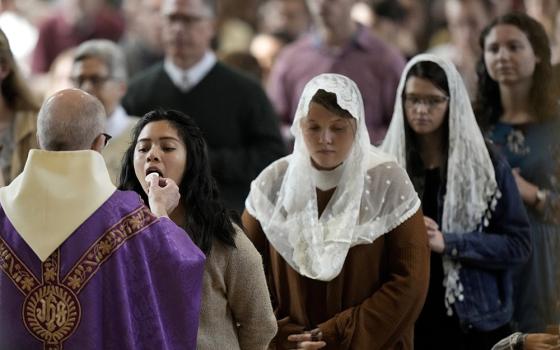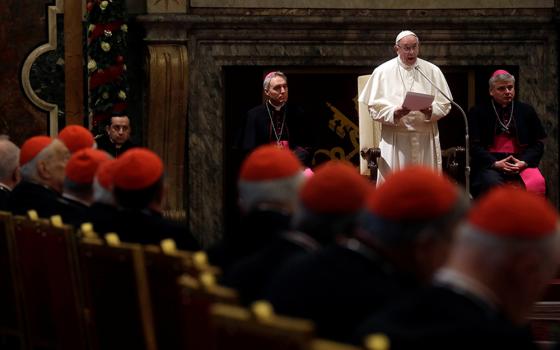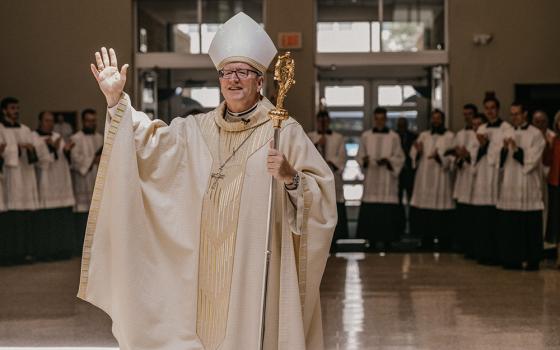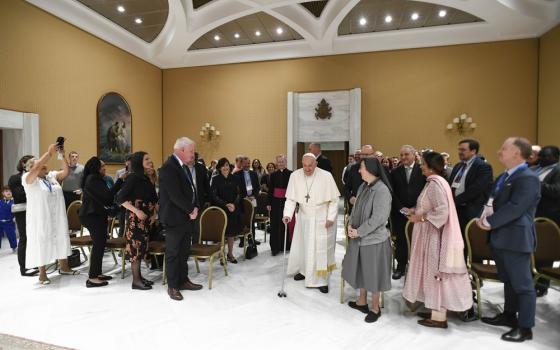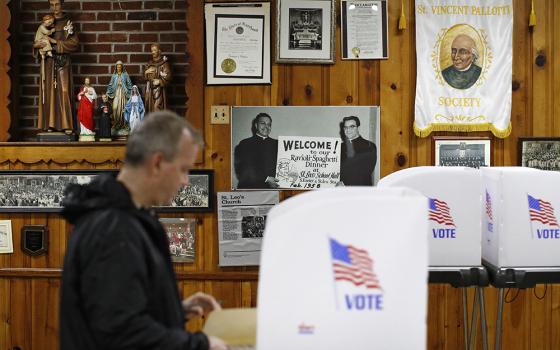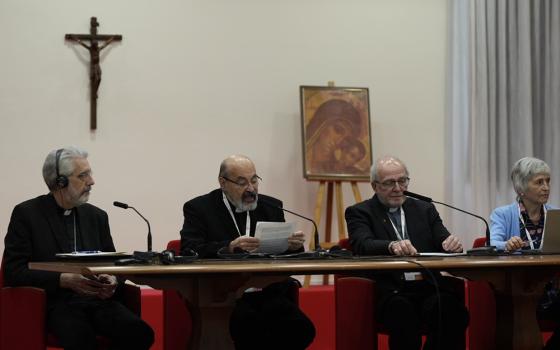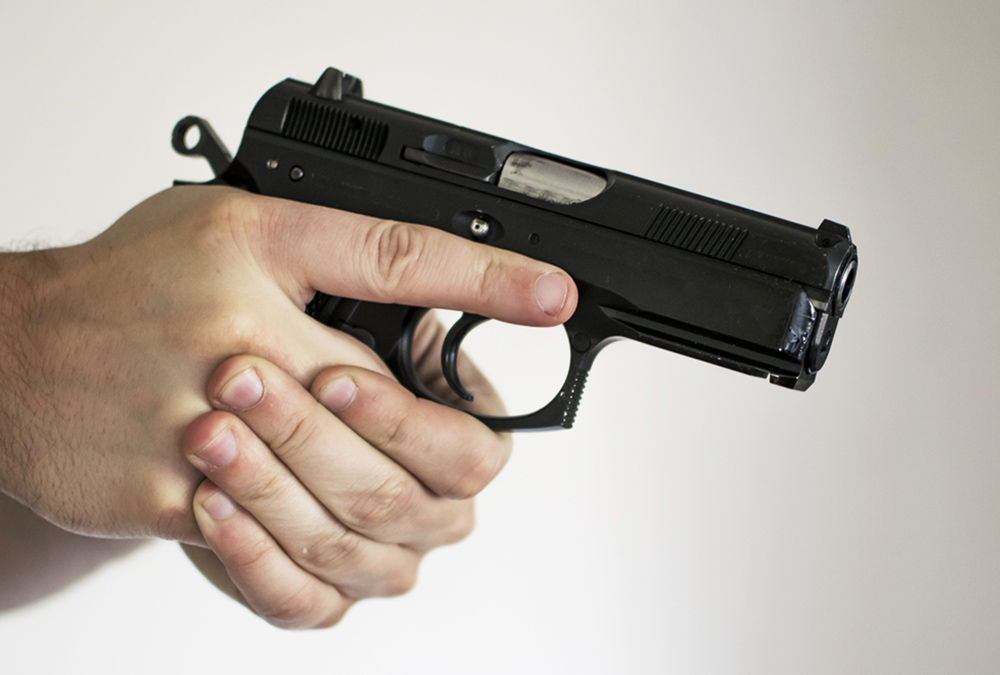
(Dreamstime/Seth Anderson)
Halfway through the year, it looks like 2023 may have as many, perhaps even more, mass shootings and school shootings than other recent years. According to the Gun Violence Archive, which defines a mass shooting involving a minimum of four victims, either injured or killed, not including the shooter, there have been more than 400 mass shootings thus far this year.
While many of these shootings may be attributable to racism, anti-religious hatred, social alienation, disputes among adolescent groups, and anger combined with fear, others are identified as "defensive gun use," which the Gun Violence Archive defines as "reported use of force with a firearm to protect and defend oneself or family."
Although there have been just over 650 defensive uses of guns so far this year, that number has declined in recent years, in contrast to school and mass shootings.
This countertrend is particularly interesting given that personal safety or protection is the main reason that most Americans give to justify their ownership of a gun. For them, a gun is reckoned necessary to defend oneself and, if there is one, their family from a deadly attack. Some, moreover, view a firearm as needed for protecting their property.
For Catholics who own or are considering purchasing a firearm, it is important to make clear that not all defenses of gun ownership are consonant with our moral tradition.
As a former law enforcement officer, I too have owned a gun. As a theological ethicist, though, I cannot take these stated reasons — safety and protection, or in other words, defense — at face value even though I do take them seriously.
For Catholics who own or are considering purchasing a firearm, it is important to make clear that not all defenses of gun ownership are consonant with our moral tradition. Indeed, some recent shootings, allegedly done in defense of self or property, should move us to reconsider what the Catechism of the Catholic Church calls "legitimate defense."
Earlier in June, Susan Lorincz, a 58-year-old white woman, shot through her front door and killed a neighbor, Ajike Owens, a 35-year-old Black mother of four, near Ocala, Florida. According to the sheriff's office, Owens was knocking on the door, asking Lorincz to come out and explain why she had gotten angry over Owens' children playing in a nearby field, including throwing a roller skate at her 10-year-old son, who was standing next to her moments later when she was shot.
The shooting was similar to four shootings in April that received significant media attention.
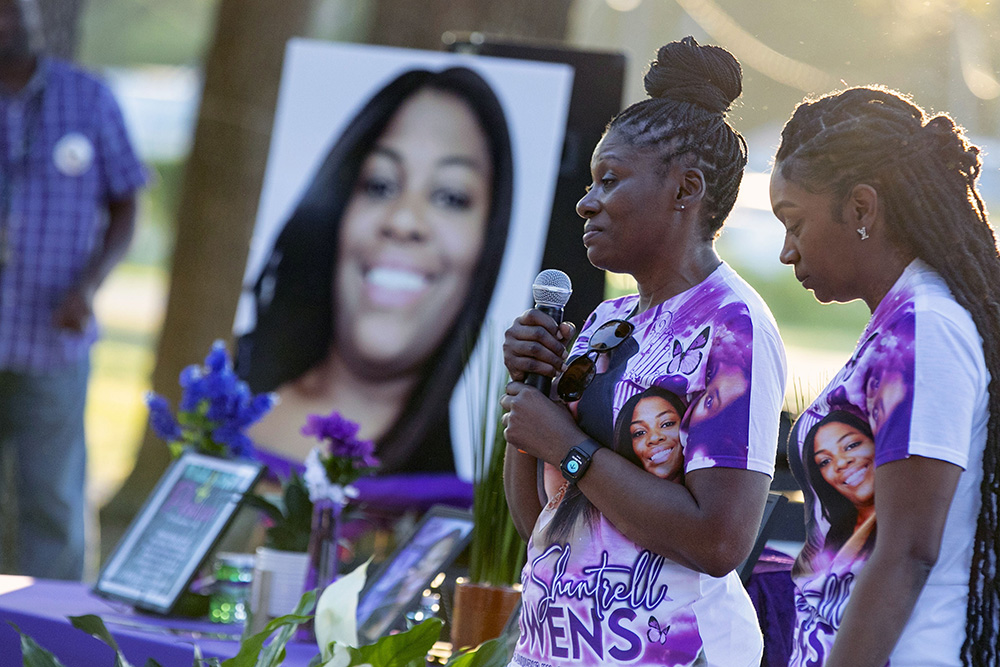
Pamela Dias, second from right, remembers her daughter, Ajike Owens, as mourners gather for a remembrance service for Owens at Immerse Church of Ocala, Florida, on June 8. Susan Lorincz, who is accused of firing through her door and fatally shooting Owens, was charged on June 26 with manslaughter and assault. (AP/Alan Youngblood, File)
On April 13, 84-year-old Andrew Lester, who is white, shot and wounded a 16-year-old Black teenager, Ralph Yarl, who rang his doorbell in Kansas City, Missouri. Lester told police he thought Yarl was attempting to break into his home and that he was "scared to death" due to the boy's size, so he fired immediately after opening the door.
On April 15, in upstate New York, a 20-year-old woman, Kaylin Gillis, was killed by 65-year-old Kevin Monahan, who fired two shots at the car she was riding in with three others as it was leaving after accidentally turning into the wrong driveway.
On April 18, cheerleaders Heather Roth, 21, and Payton Washington, 18, were shot and wounded by Pedro Tello Rodriguez Jr. after Roth mistakenly entered a vehicle in a supermarket parking lot near Austin, Texas. Roth had walked away to get into another car. When she rolled down a window to apologize to Rodriguez as he approached, he fired at her.
Also on April 18, 6-year-old Kinsley White and her parents, William White and Ashley Hilderbrand, were shot and injured by Robert Singletary, a 24-year-old Black man, after the child's basketball rolled into his yard in Gaston County, North Carolina.
In each of these incidents, the shooter didn't hesitate to use lethal force. Why? Racism played a role, perhaps, in three or four of these incidents.
Also, as Phyllis Zagano observes, "anger is clearly at the root of it all." While she adds that fear, too, factors into the equation, I believe that, as Christine Emba suggests, it boils down to this "one common emotion" — "a feeling that the world had become a more dangerous place."
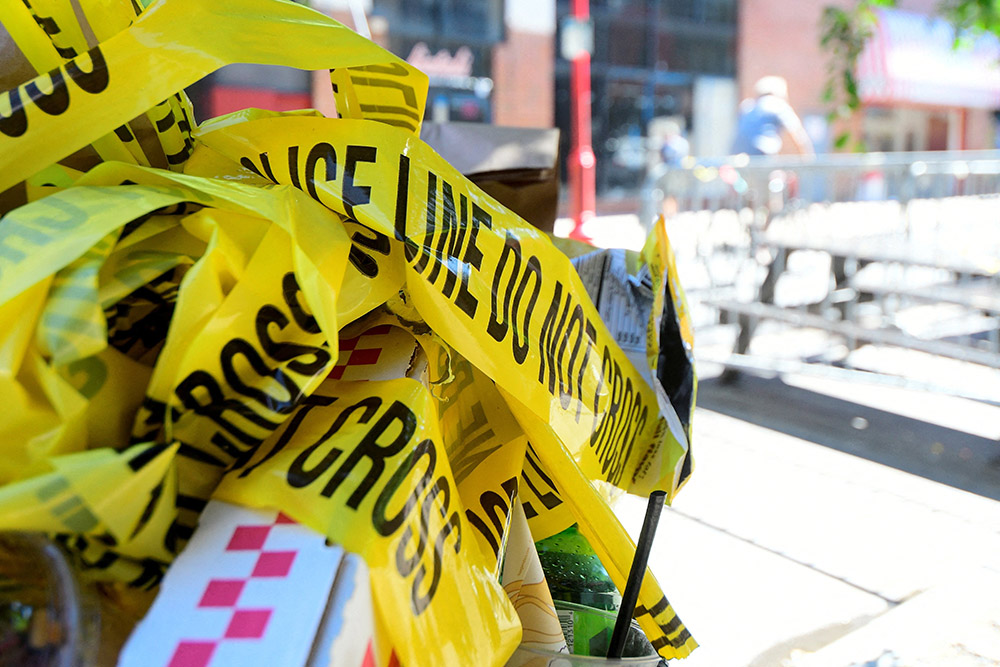
Police tape is pictured near the site of a mass shooting crime scene in Philadelphia in this file photo from June 2022. (OSV News/Reuters/Bastiaan Slabbers)
All of which brings us back to the No. 1 reason that Americans give for owning a gun: defense.
Indeed, I would not be surprised if each shooter, in these recent incidents, attempted to "justify" their use of lethal force as defense of self or property against a perceived threat. References have been made to "stand your ground" laws, which a growing number of states have passed, Florida being the first to do so in 2005. As CNN explains, the "stand your ground" justification for using deadly force holds "that even when a person is outside of their home, they can stay where they are without retreating, even if they can avoid the danger by retreating." It was the basis for the acquittal of the shooter of Trayvon Martin in 2012.
Philosopher Firmin DeBrabander, in his indispensable book Do Guns Make Us Free?: Democracy and the Armed Society, notes that these laws are "a departure from the common-law requirement that persons faced with a threat — in public — have the duty to withdraw or avoid confrontation if possible, and use force only as a last resort."
Indeed, "stand your ground" laws are an expansion of the 17th-century English common-law "castle doctrine," which holds that "your home is your castle, and you have the right to use lethal force to defend your home and not retreat," CNN said in an April report.
The "stand your ground" laws, DeBrabander observes, "absolve an individual anywhere of the duty to retreat, if he or she detects an imminent threat to his or her person."
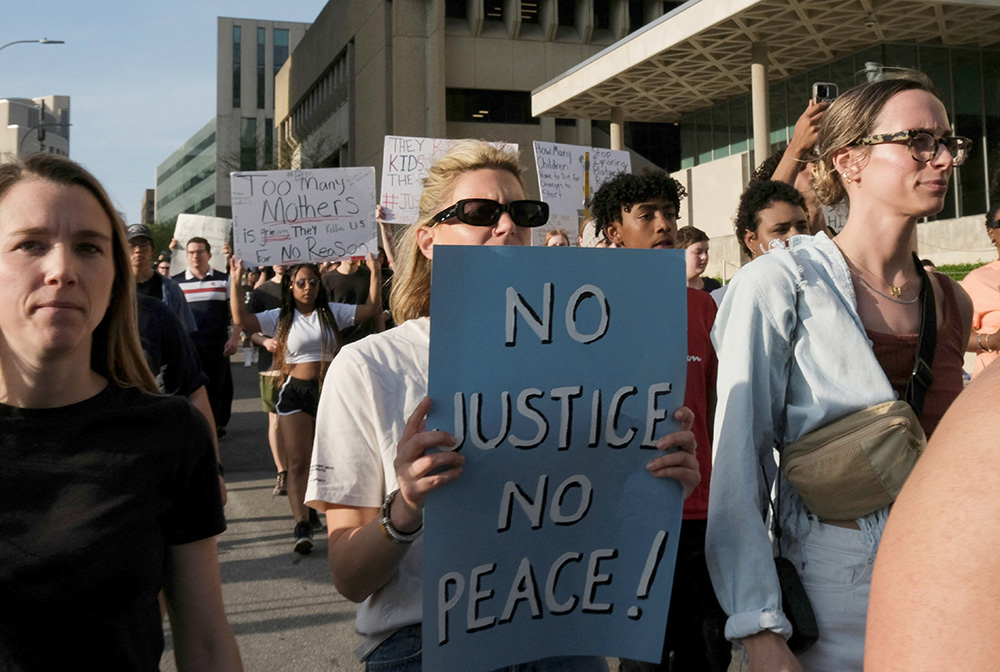
People attend a protest in Kansas City, Missouri, April 18, after 16-year-old Ralph Yarl, who is Black, was shot and wounded by a white homeowner after the boy mistakenly went to the wrong house to pick up his siblings. (OSV News/Reuters/Dominick Williams)
A key word in "stand your ground" statutes is "reasonableness." A person may use deadly force if they "reasonably believe" it is necessary to do so to defend himself or herself from great bodily harm or death.
Accordingly, as former FBI agent Josh Campbell explains it in connection with the shooting of Yarl by Lester in Kansas City: "Was that type of potentially lethal force reasonable? And did the shooter reasonably believe Yarl posed a threat? Even in your home, the law says you can't simply open fire on someone at your doorway without being able to articulate a threat justifying that kind of deadly force."
The claim that any of these recent shootings were "necessary" for defense, in my estimation, displays an incredible stretch of "reasoning" if not the imagination.
My skepticism concerning the degree to which my fellow citizens grasp what "reasonableness" requires for when and how to use deadly force should not be surprising, given that ongoing work is being done, after all, to improve "threat assessment" abilities and skills of police officers. Such efforts require regular and ongoing practice. If police have lacked sufficient training, I worry that average citizens, as these recent shootings reveal, will prove even more wanting.
Moreover, while American police have been criticized for killing unarmed Black persons, studies on "implicit bias" reveal stark differences between the responses of police officers and civilians. Law professor Katheryn Russell-Brown writes in Policing the Black Man: Arrest, Prosecution, and Imprisonment, "The community members were more likely than the officers to shoot unarmed black targets ... [and] community members were overall more likely to shoot black targets than white targets."
Advertisement
Likewise, law professor Kristin Henning in Policing the Black Man points to a study that found police frequently emphasize the larger size of Black adolescent boys and overestimate their age by five years, while underestimating the age of adolescent White male suspects by one year. I suspect such implicit bias played a role in Lester's shooting of Yarl in Kansas City.
Beyond these problems concerning "reasonableness," I would note that, at least for Catholics, defensive armed force was not always regarded as a personal right. During the first three centuries, many if not most Christians were pacifists who refused to shed blood. As Tertullian (160-220 C.E.) in his On Idolatry put it, "The Lord, by disarming Peter, unbelt every soldier."
Although Ambrose (339-337) and Augustine (354-430) justified the use of armed force in what would come to be known as just war theory, they both prohibited the use of lethal force by individual persons in self-defense. Only magistrates and soldiers were morally permitted to employ armed force to defend themselves and those they were authorized to protect.
When Thomas Aquinas (1225-74) in his Summa Theologica wrote about "Whether it is lawful to kill a man in self-defense," he answered that such armed force is justified as long as one's intention is to "save one's own life" but not if "intending to kill a man in self-defense."
In other words, if it is possible to defend oneself without killing the attacker, one should do so. Aquinas also emphasized that if a person, "in self-defense, uses more than necessary violence, it will be unlawful."
Defensive armed force was not always regarded as a personal right. During the first three centuries, many if not most Christians were pacifists who refused to shed blood.
Drawing from Aquinas, the catechism views armed force as "legitimate defense" as long as the intention is not the death of the attacker and the use of force is done "with moderation," not involving "more than necessary violence." Otherwise, the presumption, according to the catechism, is that defensive force is the responsibility of the police — "Those holding legitimate authority have the right to repel by armed force aggressors against the civil community entrusted to their charge."
As the U.S. bishops put it in their 1983 pastoral letter, "The Challenge of Peace," "The possibility of taking even one human life is a prospect we should consider in fear and trembling."
For Catholics who own or are considering the purchase of a firearm for protection and safety, the "stand your ground" and "castle doctrine" justifications for deadly force are morally problematic, to say the least.
Not only does "legitimate defense" from a Catholic ethical perspective rule out, for example, military-grade weapons such an AR-15 style rifle, which are manufactured for war, with the intention of killing of others built into them, so too does it call into question the use of lethal force to defend one's property unless doing so is truly necessary for saving one's life.
Finally, we ought to explore, learn and use other means that are available for protection. Pope Francis invites us "to cultivate nonviolence in our most personal thoughts and values" so that "charity and nonviolence govern how we treat each other as individuals, within society and in international life." Catholic parishes, parochial schools, universities and colleges should prioritize nonviolent methods for addressing threats and conflict, including de-escalation practices. There is a high burden of proof, though not an absolutely insurmountable one, for Catholics to justify owning or purchasing a gun in "legitimate defense."






